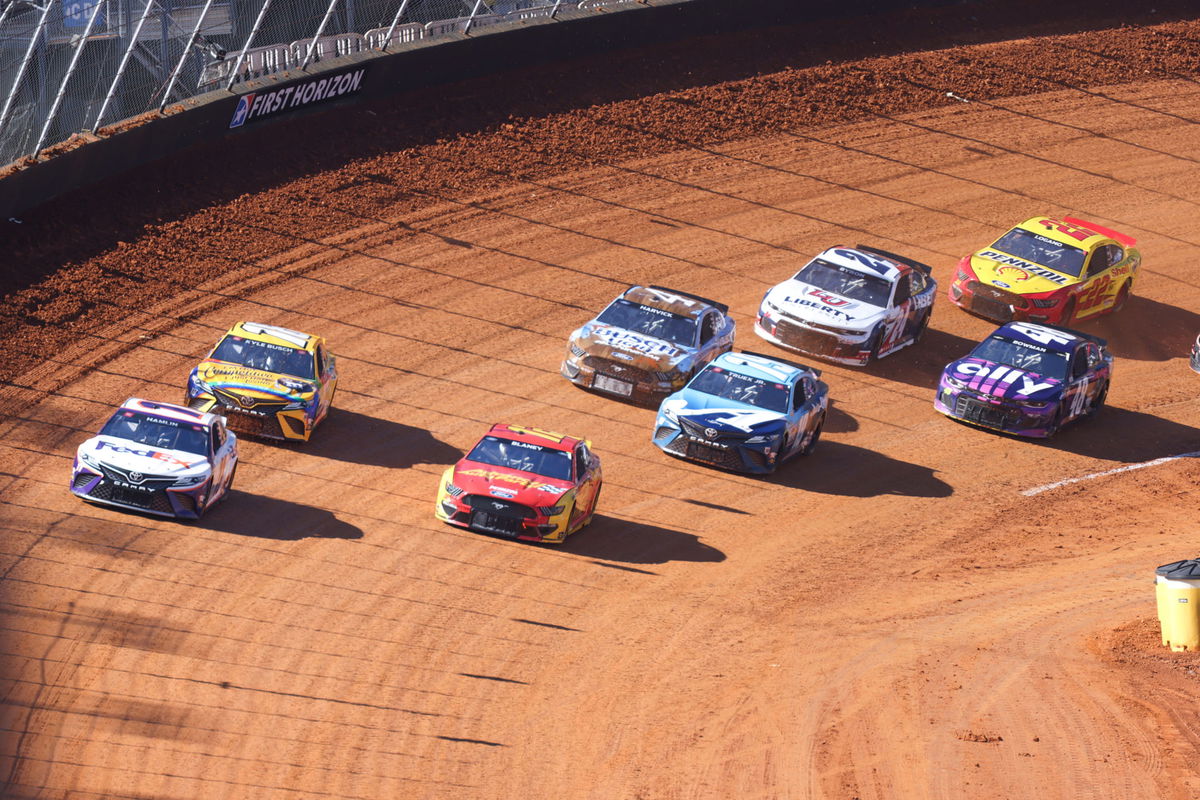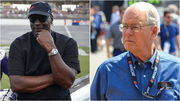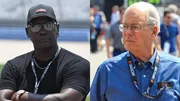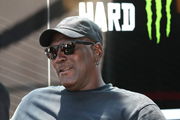
USA Today via Reuters
Mar 29, 2021; Bristol, TN, USA; NASCAR Cup Series driver Denny Hamlin (11) leads the first lap during the Food City Dirt Race at Bristol Motor Speedway. Mandatory Credit: Randy Sartin-USA TODAY Sports

USA Today via Reuters
Mar 29, 2021; Bristol, TN, USA; NASCAR Cup Series driver Denny Hamlin (11) leads the first lap during the Food City Dirt Race at Bristol Motor Speedway. Mandatory Credit: Randy Sartin-USA TODAY Sports
NASCAR is steadily inching closer to the end of its current charter agreement with the teams. With no progress being made in the negotiations, talks of a public strike by teams during the hottest races of the year have been threatening the atmosphere. The words of the promotion’s president Steve Phelps too sway like a pendulum and the mood in the camps keeps fluctuating. As is the key to any negotiation, the trick for the smooth settlement of matters is to find a common ground between all parties.
Watch What’s Trending Now!
With the teams’ biggest demand—permanent charters—almost out of the question for NASCAR from what we have heard so far, the ask for longer practice sessions from the likes of Brad Keselowski might just be the golden key to unlocking that common ground.
ADVERTISEMENT
Brad Keselowski leads the demand for longer practice sessions
In an address to the media last month, Steve Phelps proposed “Cost Containment” as a strategy for teams to turn profitable. He wants the teams to do their part in finding ways to cut their operational costs, just like the promotion did its part in figuring out ways to bring in more revenue for itself and the outfits. NASCAR’s take on practice sessions has also evolved in the aftermath of the pandemic. From not having practice and qualifying sessions altogether, we saw them return in 2022 and 2023, albeit at a lower intensity as compared to previous years.
RFK Racing co-owner and #6 driver Brad Keselowski mentioned in a recent interview in Nashville that the desired results of the cut-down practice sessions, as far as cost savings are concerned, haven’t materialized. Mentioning that he’d like to see longer sessions, he said, “I think there is a value to having some practice. I don’t think that the cost savings are that significant. I think initially there were some thoughts that we could save a little money and maybe increase the competitiveness of the field. I think yes and no, some of it has happened and some of it hasn’t. But I think having a little bit of practice is a good thing.”
Brad Keselowski, speaking a couple of weeks ago in Nashville, said from both a driver and owner standpoint, he would like to have more practice than the current single practice-qualifying session: pic.twitter.com/VTP5Y0LRfU
— Bob Pockrass (@bobpockrass) December 11, 2023
ADVERTISEMENT
Keselowski’s ask for longer practice sessions isn’t a new deal. He had told NBC Sports’ Dustin Long last year, “I think we’ve probably saved a million or two in travel and spent it all back in simulation [Practice Simulations] and engineering to try to unload at the racetracks and not blow out tires and still be fast, and arguably that’s not working for anybody. It’s definitely time for a deep dive and look back at the weekend schedules and the practice and qualifying formats.”
Despite the validity and logic behind the words of the 2012 Cup champion, there are still several teams and drivers out there that are in favor of the reduced “on-road” time. In such a scenario, what could pull them towards wanting longer practice and qualifying sessions?
ADVERTISEMENT
Watch This Story: Nascar’s Short Track Dilemma: A Veteran Reporter’s Bold Call to Action
Top Stories
What Settlement Agreement Have Michael Jordan & NASCAR Reached? Everything to Know From Evergreen Charters to Payout

Michael Jordan Brings NASCAR to Its Knees as Jim France’s Courtroom Collapse Triggers Settlement

Denny Hamlin Gloats as Jim France Forced to Eat His Words Against Rick Hendrick & Co.

NASCAR Flexes Authority With Drastic ‘Sign or Sell’ Charter Clause Hours After $365M Lawsuit Settlement

Michael Jordan Makes 8-Word Statement After Forcing NASCAR to Lawsuit Settlement

Why longer practice sessions are an essential need for NASCAR’s teams
The short duration of the practice and qualifying sessions over the last year and for 2024 has received criticism from fans. As many continue to travel long and far to watch their favorite drivers in action, longer sessions create a more holistic spectator experience. With new arguments over the accessibility of drivers during race weekends also turning out to be a hot topic of debate over the last few days, the racing teams could definitely find ways to use the longer runs.
ADVERTISEMENT
One of the other key contentions of those asking for longer sessions, including Keselowski’s, is that the extended runs would help ensure safety better. More track time before a race translates to more opportunities for teams to detect issues and understand the character of the car on the day. Particularly, with the new Fords and Toyotas, that seems to be required.
However, not all drivers are in favor of longer practice sessions. 23XI Racing star Tyler Reddick said at the NASCAR Champion’s Week in Nashville, “There’s only so many changes you can make. So, 20 minutes is more than enough really. Unless we can make changes to the car […] I think it’s fine. It won’t be a big issue for us.”
With the practice-qualifying single-session format returning for most races in 2024, what do drivers think about it? I thought Tyler Reddick might have wanted more practice last year since he moved to a new team but he told me in Nashville he didn’t think it was much of an issue. pic.twitter.com/aG25VRc2Y4
— Bob Pockrass (@bobpockrass) December 11, 2023
ADVERTISEMENT
If teams are to involve practice and qualifying sessions as a card that they want to play in their charter negotiations with NASCAR, there needs to be uniformity between their outlooks on the matter. Considering the current scenario in which that’s lacking, we cannot be certain that it would come up on that particular table.
Despite all the benefits that the longer run times would have, the idea of cutting down the revenue that teams get from NASCAR in favor of longer practice runs does not carry favorable odds. For now, we will have to wait for word on both the charter agreements and the qualifying format going ahead past 2024. It’s unlikely that the two aspects would cross paths.
ADVERTISEMENT
ADVERTISEMENT
ADVERTISEMENT
ADVERTISEMENT

